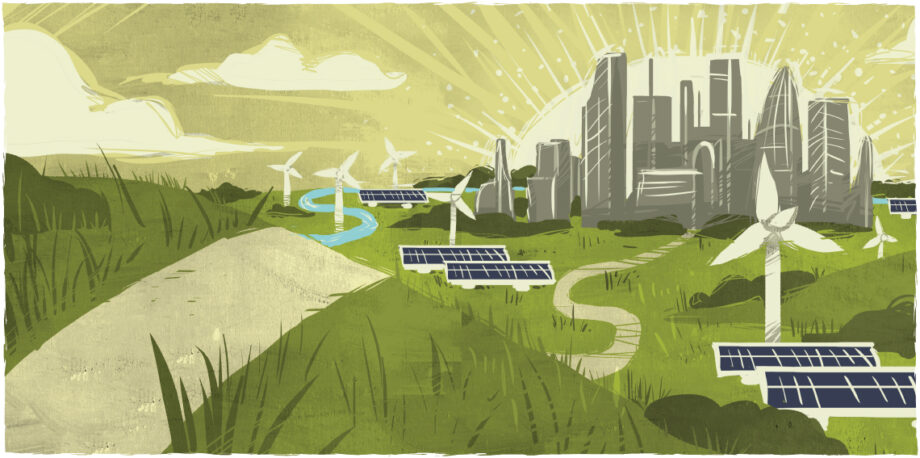December 15, 2015 — Is the Paris Climate Agreement good enough? Can the world build a low-carbon economy fast enough?
These are critical questions for the future of humanity, so it’s important to consider them carefully. But too many people in the press and in the business world are unnecessarily dour about the whole thing.
Consider two important voices that spoke up at the start of the Paris COP 21 climate conference. First, David Brooks, the quasi-self-appointed “reasonable” voice of moderate U.S. conservatism, penned a skeptical op-ed about the prospects for global change. Although he gave his arguments a veneer of tech optimism, he mainly focused on how hard will be to reduce carbon emissions. Brooks lamented, “the pain in reducing carbon emissions is individual but the good is only achieved collectively. You’re asking people to impose costs on themselves today for some future benefit they will never see.”
Second, listen to Alan Murray. He’s the editor of Fortune magazine, a publication that has covered the greening of business fairly extensively and positively for a decade, going back to an important cover story, “Green Machine,” which was accompanied by the cover line “Wal-mart Saves the Planet.” But Murray personally is clearly wary of a large-scale move to a clean economy, tweeting, “Sadly, U.S. is split between those who deny climate change and those who embrace wildly unrealistic solutions.”
Sadly, U.S. is split between those who deny climate change and those who embrace wildly unrealistic solutions @pewresearch @FortuneMagazine
— Alan Murray (@alansmurray) November 30, 2015
He goes on to say the quest for a low-carbon world could “destroy the economy.”
Or destroy the economy. https://t.co/ORJdtmqRqX
— Alan Murray (@alansmurray) November 30, 2015
These views on the cost and feasibility of building a low-carbon world are not uncommon in the business world. But they are dated, damaging and dead wrong. We need a broad coalition of business, government and citizens to tackle a problem as large and complex as climate change. Telling people it’s not possible is worse than unhelpful. Luckily, most of the world is now ignoring the naysayers.
A Serious Response to a Serious Problem
Before addressing their biggest concerns, let’s stipulate something. Fossil fuels brought billions of people out of poverty. Society has invested for 150 years in infrastructure to power modern life. So of course it’s daunting to contemplate moving the world away from what we know. And many fossil fuel companies and petro-dictatorships are fighting the transition with their immense influence and power.
Nobody said it would be easy.
But throwing up our hands and saying “this is all too hard” is not much of a response to a serious problem. And, more important, the reasons for optimism are now bountiful.
Let’s look at Brooks’ commentary more closely. He says there are costs, which is a deceptive (or perhaps uneducated) way of referring to smart investments: All business or government expenses are choices about where to put capital. But the weirdest and most dated part of his statement is saying we’ll “never see” the benefits of a clean economy. Quite literally, China will see clearer air by reducing coal use and traffic in Beijing and other megacities. And for business, there’s an enormous range of initiatives that slash costs quickly — such as lighting and building retrofits, efficiency, and now even renewables. Companies like Walmart, Google and Apple are cutting carbon, buying tremendous quantities of renewable energy and saving money doing it. So when is this “never” that Brooks speaks of?
The idea that it’s just too expensive to go low carbon is one of the big myths that are crumbling right now. If anything, the best economic analyses show that not moving away from fossil fuels will be devastating to humanity and our economies — a possible US$72 trillion expense over the next 40 years, according to a report from Citi. The bill for inaction is already starting to come due. Look at the costs of droughts like the one in California, or the immense human and economic toll of the “once-in-a-century” rains and floods in Chennai, India. Ford, BMW and many other multinationals have factories there. Lost production is expensive.
Citi’s study also suggests that we can take the trillions of dollars we will be spending on infrastructure and fuel in the coming years and point it toward renewables instead of old, dirty technologies. The total bill will be the same or less, just without the carbon and climate risk. So, far from destroying the economy, the low-carbon world will save it.
It’s true that it is a big job to turn over the world’s energy systems. But the need to cut carbon fast is not driven by love of polar bears. It’s about keeping the planet livable and productive for humans and our businesses and economies.
The continuing good news is that the new technologies are getting much cheaper all the time. Solar and wind costs have plummeted around 70 to 80 percent in the past five years, and a number of analyses tell us that, as the International Energy Agency and Bloomberg noted, “fossil fuels [are] losing cost advantage over solar, wind.” The world seems to have noticed this economic shift: More than half the new energy built today is renewable.
Murray has his concern about wildly unrealistic expectations, but I have a practical point. It’s true that it is a big job to turn over the world’s energy systems. But the need to cut carbon fast is not driven by love of polar bears. It’s about keeping the planet livable and productive for humans and our businesses and economies. We’ll do what’s required because we have to, based on physics and economics.
It’s a strangely defeatist attitude to declare visionary thinking as unrealistic. Imagine rewinding the clock 25 years, when some were likely predicting a cellphone in every hand or magical portable computers that would give everyone access to the world’s knowledge. I’m sure many said it was impossible, but most in business probably eagerly embraced the massive multi-trillion-dollar build-out of the mobile industry in the 1990s and 2000s. So why not get excited about the trillions moving us toward a more resilient, distributed-energy, renewable-based world?
Predictions From Optimists
I prefer to get my predictions from optimists — people like Tesla’s Elon Musk who are painting a world of electric cars and renewable energy and moving forward to build it. And now we have the biggest source of optimism to date: In what is perhaps a first in human history, representatives from nearly 200 nations agreed in Paris to cut emissions over the next 10 to 15 years.
Yes, the deal has huge flaws. It has limited repercussions for countries not meeting targets, the tracking and transparency could be stricter, and even if we meet the current targets, we come up far short of slowing warming to 2 °C.
Companies are coming off the sidelines now for real, committing to serious reductions in carbon and massive investments in renewables.
But these are all problems we can deal with if everyone is on board. And, most importantly, the deal tells business and the markets that governments are serious. Investing in building the low-carbon economy just got even more rational. Why, then, is the carping from the sidelines usually couched as the more reasonable, sober position versus pie-in-the-sky or naïve activists wanting a renewable-powered world?
It’s easy to be depressed about the situation we’re in. Corralling close to 200 countries to act in collective best interest is obviously hard. And the science is not helping, because the climate problem is moving fast (I’m sick of seeing headlines like “The Arctic is melting faster than scientists thought”).
But the reasons for hope are now plentiful: from rapidly improving economics, to serious action in the business community, to global citizen and political will-building. Those denying we have a problem are being sidelined within nearly all governments (except the U.S. Congress) and increasingly, I find, within executive suites and boardrooms. Companies are coming off the sidelines now for real, committing to serious reductions in carbon and massive investments in renewables.
Globally, we’ve finally achieved a consensus that there is a serious problem. We’re nearing consensus that it’s in our economic and moral interest to do something about it. So it’s time for everyone to join the parade, criticize only when it’s productive and suggest real solutions that help us build a thriving world.
![]()
Editor’s note: The views expressed here are those of the author and not necessarily of Ensia. We present them to further discussion around important topics. We encourage you to respond with a comment below, following our commenting guidelines, which can be found here. In addition, you might consider submitting a Voices piece of your own. See Ensia’s “Contact” page for submission guidelines.
Ensia shares solutions-focused stories free of charge through our online magazine and partner media. That means audiences around the world have ready access to stories that can — and do — help them shape a better future. If you value our work, please show your support today.
Yes, I'll support Ensia!
